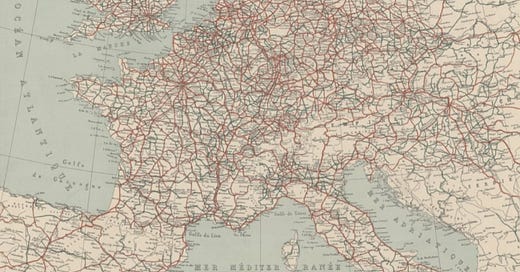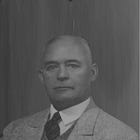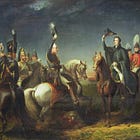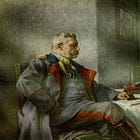In the issue of that magazine dated April, 1939 Wissen und Wehr (Knowledge and Defense) published a substantial reply to the three articles articles that Georg Wetzell had written in response to the introduction that Wolfgang Foerster wrote for his book Heerführer des Weltkrieges (Military Commanders of the World War.) The sub-series continued with this post presents a translation of this article made by Frederick W. Morton in 1939 and revised, with reference to the German original, by Your Humble Servant.
For the first two posts in this sub-series, please see
For links to translations of the articles written by General Wetzell and, when they appear, the other parts of Lieutenant Colonel Foerster’s article, please see
Wolfgang Foerster
The Picture of the Modern Military Commander:
A Word of Defense and Explanation
(Continued)
In order to prove the influence of the technical advancements of the 19th century upon the actions of the modern military commander, I made reference to his work in time of peace, especially the preparations for the concentration, and cited the well-known expression of Moltke: ‘Mistakes made in the original concentration of the armies can hardly be corrected in the course of the entire campaigns.’
I drew the conclusion that the ‘work of the military commander in preparation for the victory takes place farther and farther from the scene of actual fighting and during a period preceding the operations, usually long before the outbreak of war’. Wetzell is of the opinion that Moltke’s words ‘may have applied through the seventies of the last century, but certainly did not hold true after those years, when the railroad system in Germany as that in France had grown more closely knitted and had expanded’.
In reply, we may say first of all that the Great General Staff quoted his sentence as late as 1911 in its publication of the ‘military lessons’ of Moltke, in other words, that the authorities acknowledged the truth of it shortly before the World War. It is my belief that these words of Moltke - correctly understood - apply to this day.
Wetzell mentions the greatly expanded railway net after 1871, the war games of Schlieffen with their ‘maneuvering by rail’, the advice of Ludendorff in future concentrations to place troops in readiness at suitable railroad points located far in the rear, for the purpose of rushing reinforcements to any part of the front where the situation (point of main effort) may require their support. However, I fail to see where all of this disproves the application of Moltke’s works in our modern times.
Neither the war games and general staff rides of Schlieffen, with their ‘maneuvering by rail’, nor Ludendorff’s suggestion deal with the correction of ‘errors made in the original concentration of the armies’. On the contrary, they imply the speedy exploitation of a change in the situation; or, as I stated, the point is that the military commander must make far-reaching preparations in time of peace so as to be able ‘at the outbreak of war, when confronted by the initiative of the enemy, to expand his generally fixed, yet flexible and pliable, plans, with the view of creating by strategic means favorable tactical requirements for the battle’.
Errors in the concentration are an entirely different matter than concentration measures which, due to some change in the situation, require the aid of movement by rail. As an example of an error in the original concentration, which it was impossible to make good in the course of the war by subsequent rail transports on a large scale, I wish to mention the concentration of nearly one-half of the Austro-Hungarian armies on the Balkan Front at the outset of the World War.
Wetzell admits a similar mistake in the distribution of the German forces in the concentration on the Western and Eastern Fronts in 1914. I mention this without necessarily agreeing with his views. On the other hand, I concur all the more with his opinion that the ‘essential of the military genius’ does not consist in the ‘planning’ before outbreak of war, but in the ‘acting’ after war has broken out. I still cannot find where I have offended against this idea in any of my statements.
To be continued …
For links other parts of this series, please see:








